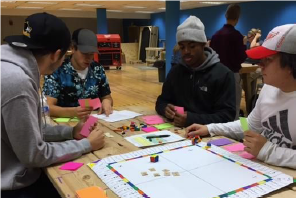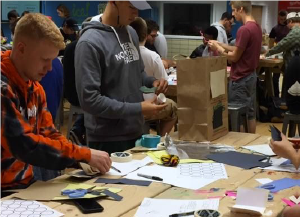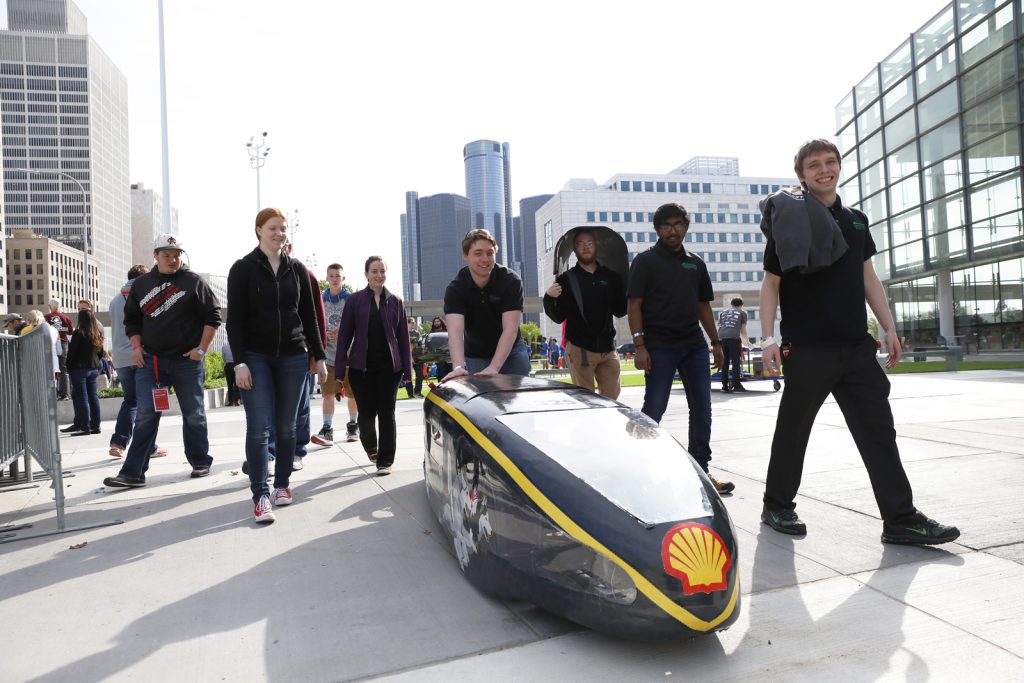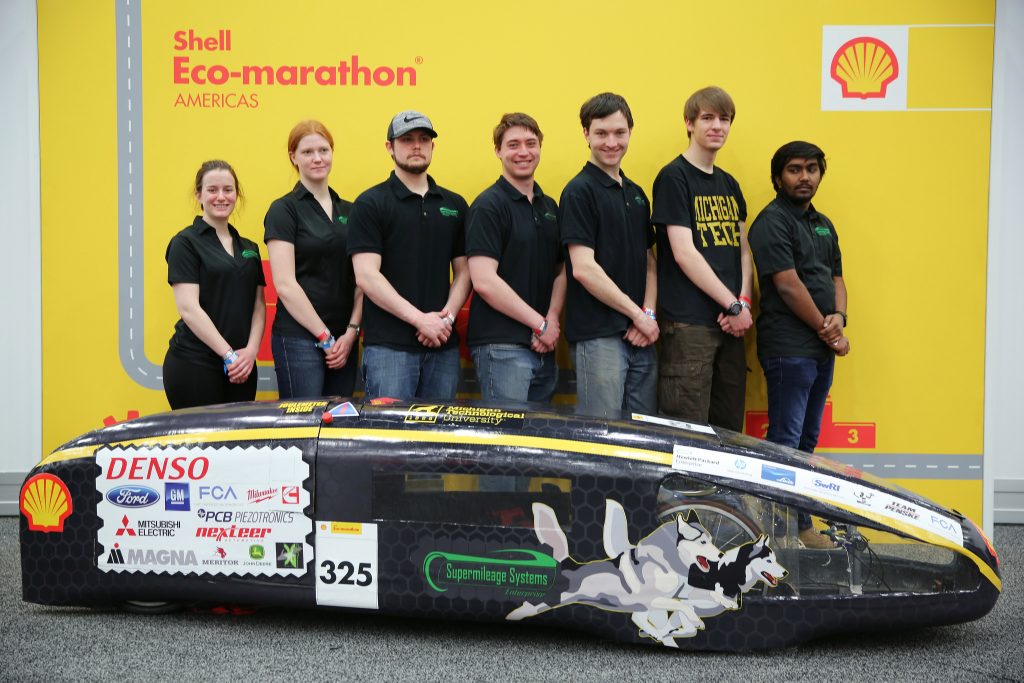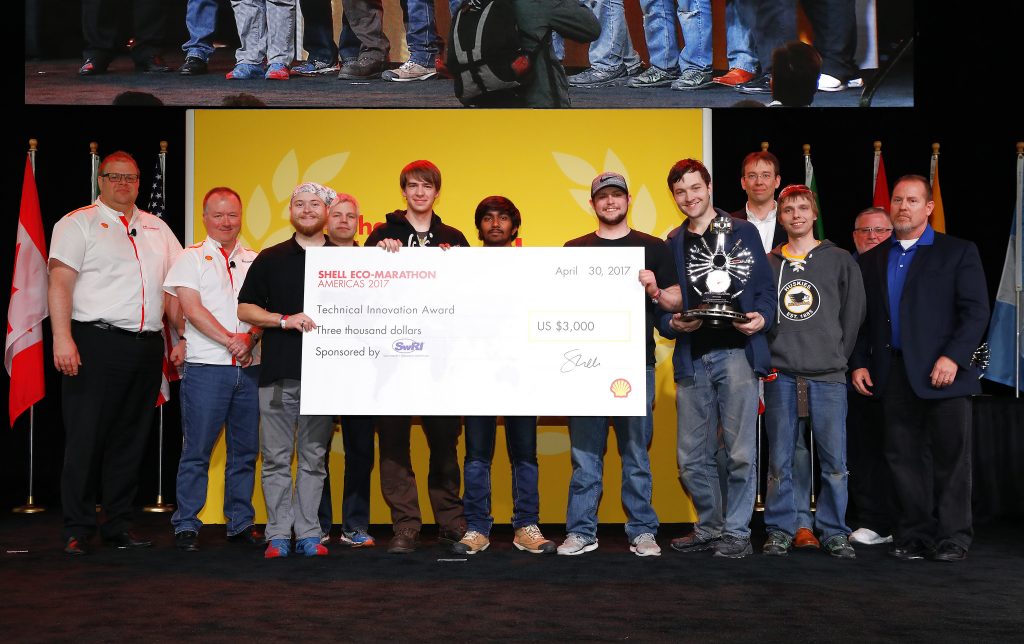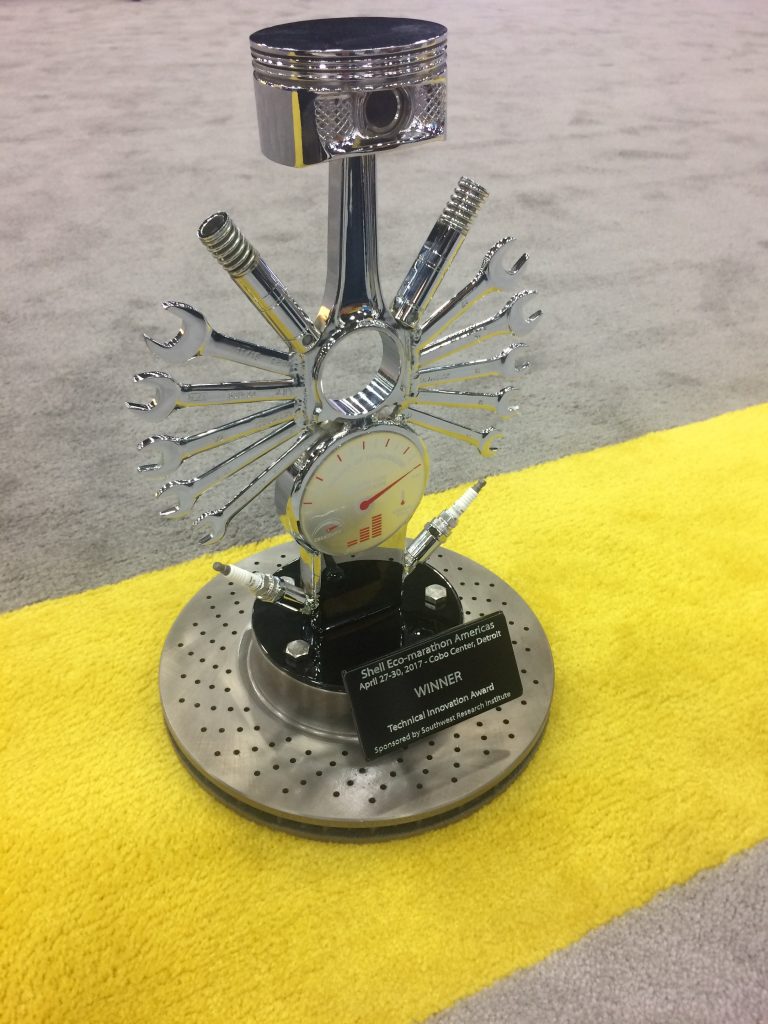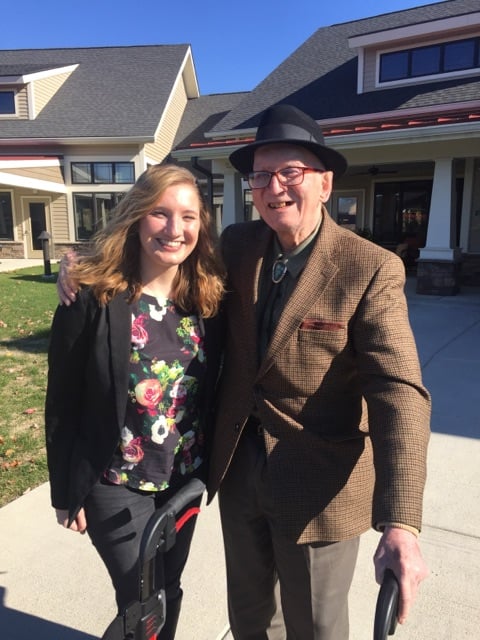
by Mark Wilcox
Michigan Tech and the honors college that bears his family name are mourning the passing of Frank Pavlis. The alumnus, benefactor and friend of the University died Friday, Aug. 24 at Legacy Place Cottages in Allentown, Pennsylvania. He was 101.
Pavlis was raised on a farm in northern Lower Michigan and was the first in his family to graduate from college. He finished at the top of his class with a degree in chemical engineering from what was then the Michigan College of Mining and Technology. Pavlis’ success in Houghton led to a fellowship from the University of Michigan where he earned a master’s degree.
Following college, Pavlis turned down a job offer from Shell Oil to become the first employee of a small new Detroit Company called Air Products. Pavlis was tasked with the design and construction of a prototype processing plant to separate oxygen from atmospheric air. The project was completed a year later with Pavlis as the chief engineer. Air Products was credited with making a significant contribution to Allied success in World War II. Today, Air Products and Chemicals Inc., now headquartered in Allentown, Pennsylvania, has more than 19,000 employees in 55 countries with annual revenues of about $10 billion.
Pavlis rose through the ranks, joining the company’s Board of Directors in 1952 and serving as vice president for engineering and finance before retiring in 1980 as vice president for international/world trade. He is said to have traveled around the world five times in his lifetime.
Throughout his professional success, he never forgot Michigan Tech. The University responded by presenting him with an honorary doctorate of philosophy. He received the Distinguished Alumni Award in 2009 and is a member of the University’s McNair and Hubbell Societies. He was the principal benefactor of the Pavlis Honors College which began in 2014.
Lorelle Meadows, dean of the Pavlis Honors College, reflected on what Frank Pavlis means to Michigan Tech.
“Frank was a visionary, foreseeing the value of a global education for the college graduate of the 21st century,” Meadows says.
“He so generously gave of his time and resources to encourage our students to reach outside of their comfort zones and challenge themselves to attain their full potential as professionals and citizens of the world.”
Pavlis was preceded in death by his wife of 55 years, Ethel, in 2002. The couple had no children.
Funeral services for Frank Pavlis will be held at 4 p.m. Monday, Sept. 10 at the Kingdom Hall of Jehovah’s Witnesses in Macungie, Pennsylvania. Contributions in his memory can be made to Jah Jireh Homes of America – Allentown, 2051 Bevin Dr., Allentown, PA 18103. Donations received will be used to fund charitable care at Legacy Place Cottages.
Pavlis will be laid to rest in the small Michigan cemetery where his wife, parents, grandparents, brother and sister are buried.
“We will all miss Frank greatly,” Meadows says. “But his legacy will live on as we continue to put his vision to work to graduate students who will go out—ready and empowered—to make their unique contributions to society with understanding, vision and a commitment that honors his life.”
For more information about Frank Pavlis or to watch a digital history of the Honors College benefactor visit mtu.edu/honors/about/frank-pavlis.
Michigan Tech is one of twelve U.S. college teams Make48 recently announced to compete in Season 3 of the national invention TV series. Make48 is a nationwide invention competition documentary series that gives teams exactly 48 hours to come up with an idea, create a prototype and promotional video and then present their idea to a panel of judges. Three winning teams are chosen and the remainder of the series highlights the process of trying to get the products to market.
Other schools that will be competing along side Tech include Georgetown, Rice, Tulane, University of Nevada-Reno, University of Miami, University of Connecticut, University of Wisconsin-Milwaukee, School of the Art Institute of Chicago, University of Illinois-Champaign, K-State Polytech, and Kansas City Art Institute. The Michigan Tech team consists of Mike Gazdecki (material science and engineering), Patrick Guyon (mechanical and electrical engineering), Rachel Kolb (mechanical engineering), and Ryan Thompson (mechanical engineering). The team took fourth place in Michigan Tech’s 2018 Consumer Products Challenge for their single serve Margarita Machine. Twenty-six teams consisting of 3-5 Tech students received a Challenge Box filled with products supplied by corporate sponsors — Amway, 3M, and Kimberly-Clark. When asked about being selected to compete in Make48, Kolb shared, “I think I’m most looking forward to working with the team again. When we made our team for Consumer Products Day, none of us had worked together before, but we ended up having a blast. This will be the perfect opportunity to use the skills I learned in the UIF program to help the team!”
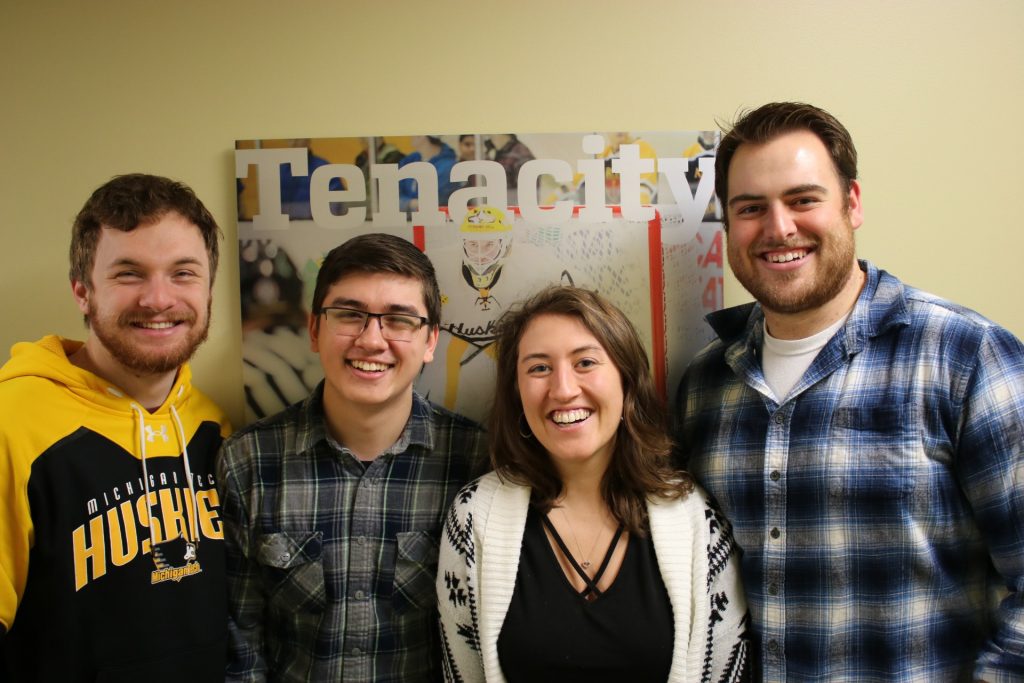
Filming will take place August 10th-12th at the Stanley Black and Decker Innovation Lab in Towson, MD, where the teams will compete in a 48-hour competition.
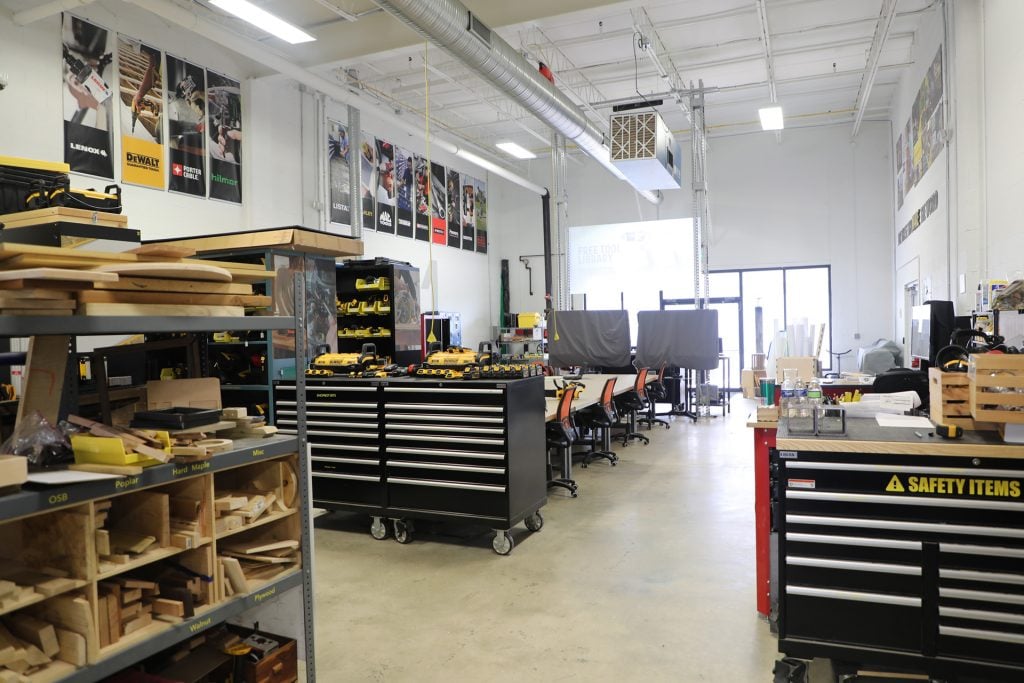
“Season three of Make48 is really exciting for us,” says Tim Perra, Vice President, Public Affairs for Stanley Black and Decker. “These students are in the midst of learning the skills needed to become innovators and entrepreneurs, and they’re going to be put to the test like never before in a 48-hour competition. We’re excited to welcome these students to our Makerspace and hopefully provide an atmosphere where they feel inspired to create the best products possible.”
Backed by industry giants like Stanley Black and Decker, Ace Hardware and QVC, Make48, which has now been picked up by 92% of American public television markets, is excited to turn the spotlight on students this time. “It will be intriguing to see what these young creative minds will invent in 48 hours. By bringing the collaboration of the Make48 tool technicians and Stanley’s state of the art innovation lab will no doubt leave this seasons judges with a hard task,” Make48 CEO, Tom Gray says.
Season 2 will premiere in September on local PBS/APT (American Public Television) stations across the country. You can catch season 1 by going to Amazon Prime Video, PBS.org or Make48.com. You can also find out more about Make48 by following them on Facebook, Twitter, or Instagram.
By Amy Karagiannakis
Michigan Tech’s Frozen Engineers were selected to represent Tech at the Make48: College vs. College competition this August in Baltimore, MD. Teams are given 48 hours to plan, prototype, and pitch an idea for prizes and licensing potential. The top three teams may have an opportunity to license their designs and take their products to market. The entire competition will be filmed in a documentary style TV series. The goal is to foster imagination, creativity, problem solving and an entrepreneurial mindset. Make48 captures the process of invention through a hands-on competition that challenges individuals of various ages and backgrounds to take product ideas from conception to physical prototype in just 48 hours.

The Michigan Tech team consists of Mike Gazdecki (material science and engineering), Patrick Guyon (mechanical and electrical engineering), Rachel Kolb (mechanical engineering), and Ryan Thompson (mechanical engineering). The Frozen Engineers took fourth place in Michigan Tech’s 2018 Consumer Products Challenge for their single serve Margarita Machine. Twenty-six teams consisting of 3-5 Tech students received a Challenge Box filled with products supplied by corporate sponsors — Amway, 3M, and Kimberly-Clark. When asked about being selected to compete in Make48, Kolb shared, “I think I’m most looking forward to working with the team again. When we made our team for Consumer Products Day, none of us had worked together before, but we ended up having a blast. This will be the perfect opportunity to use the skills I learned in the UIF program to help the team!”
Judges at Make48 are looking for highly marketable ideas that appeal to a large market and are able to be manufactured. The upcoming 48-hour invent-a-thon will take place August 10-12 in Baltimore, MD at the Stanley Black & Decker Makerspace and the Baltimore Museum of Industry. You can learn more about the other university teams competing in this year’s competition here.
By Amy Karagiannakis
The 24th Annual Student Leadership Awards were held Friday, April 20 in the Memorial Union Ballroom. The Student Leadership Awards celebrate and reward the individual and group efforts of students involved in organizations across campus. There are awards for student employees, student organizations, programs and more. Among the awards that were presented and announced at this year’s ceremony, three of the winners and 14 of the nominees were Pavlis Honors College students.
Aaron Dean, Magann Dykema, Sarah Jo Martens, Logan McMillan, and Christine Wood were nominated for the President’s Award for Leadership. Sarah Jo Martens was presented with this prestigious undergraduate award. Pavlis Honors College also presented Martens with the Departmental Scholar Award which in turn allowed her to be considered for the Provost’s Award for Scholarship. Martens is a key member of the Pavlis community, not only by academic standards, but also for her motivation, creativity, and leadership. Martens plays flute in the Michigan Tech Huskies Pep Band, serves as President of the Blue Key Honor Society – Michigan Tech Chapter, and is very active in Michigan Tech’s theatre community.
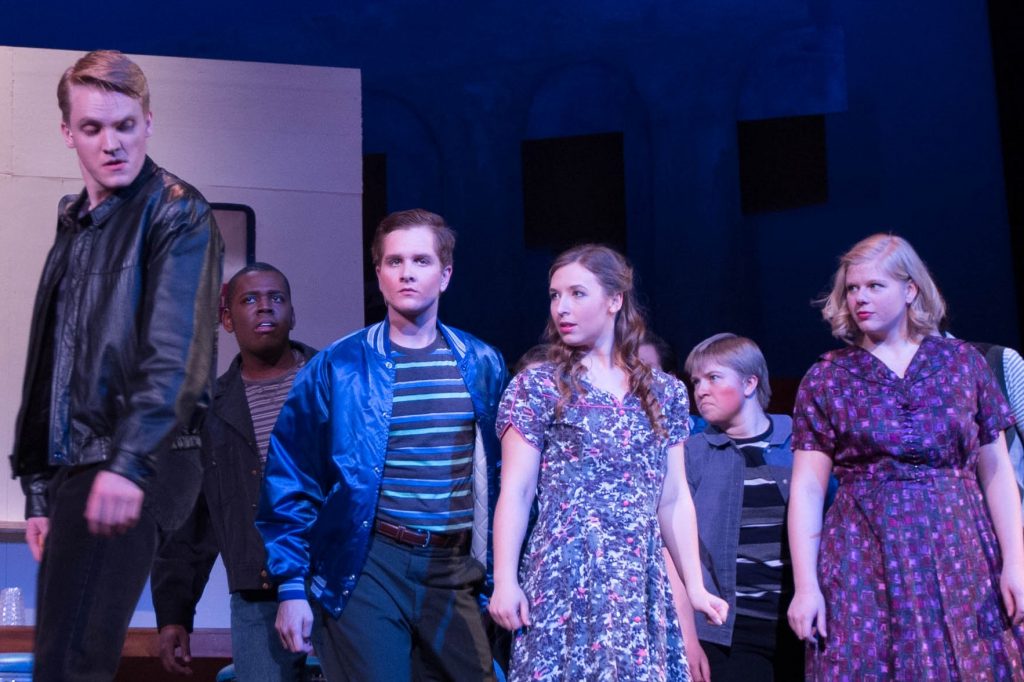
Logan McMillan was presented with the Percy Julian Award earlier this month at the annual Percy Julian Graduation Reception. This award is given each year to a Tech student who actively promotes diversity, social equality, and cultural competency. McMillan’s award was announced at the Student Leadership Awards.
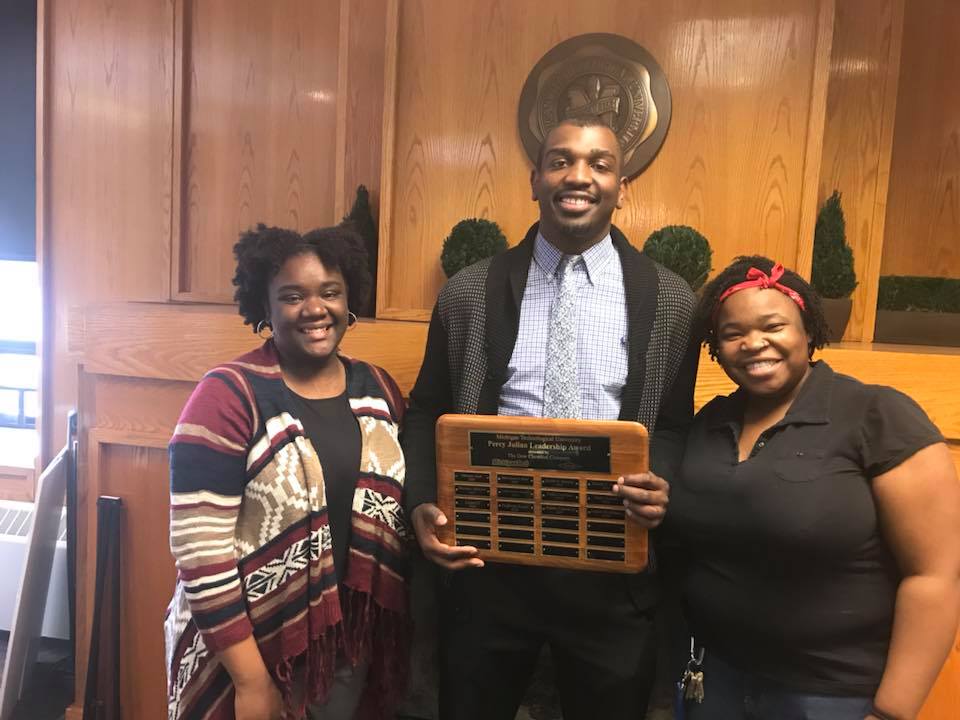
Gi West was presented with the Rising Star of the Year Award. Several Pavlis Honors College students were nominated for Rising Star, including Maya Geiselhart, Cameron Philo, and Lexi Steve. Nominees for this award are undergraduates in their first or second year who show great potential for leadership and strive for personal development in everything they do. West will be taking over as The Alley director next year.

Pavlis Honors College students Emily Lilla and Laura Schimmel were nominated for the Vice President for Student Affairs and Advancement Award for Service. This award is designed to recognize students demonstrating leadership, engagement in community, and a commitment to service. Pavlis alum, Erin Richie was presented with the 2017 Service Award and gave the welcome address at this year’s award ceremony.
The Undergraduate Research Symposium winners were also recognized at Friday’s Award ceremony. Erinn Smith (biochemistry and molecular biology) took first place for her research, Refining the Purification Process of Histone Proteins. David Ross (biomedical engineering) placed second for his research entitled, Bioactive Polydimethylsiloxane Surface for Optimal Human Mesenchymal Stem Cell Sheet Culture. Third place was awarded to Alex Baker (civil and environmental engineering) for Multiobjective Optimization of Cost and Strength for Various Lengths of Doubly Reinforced Concrete T-beams.
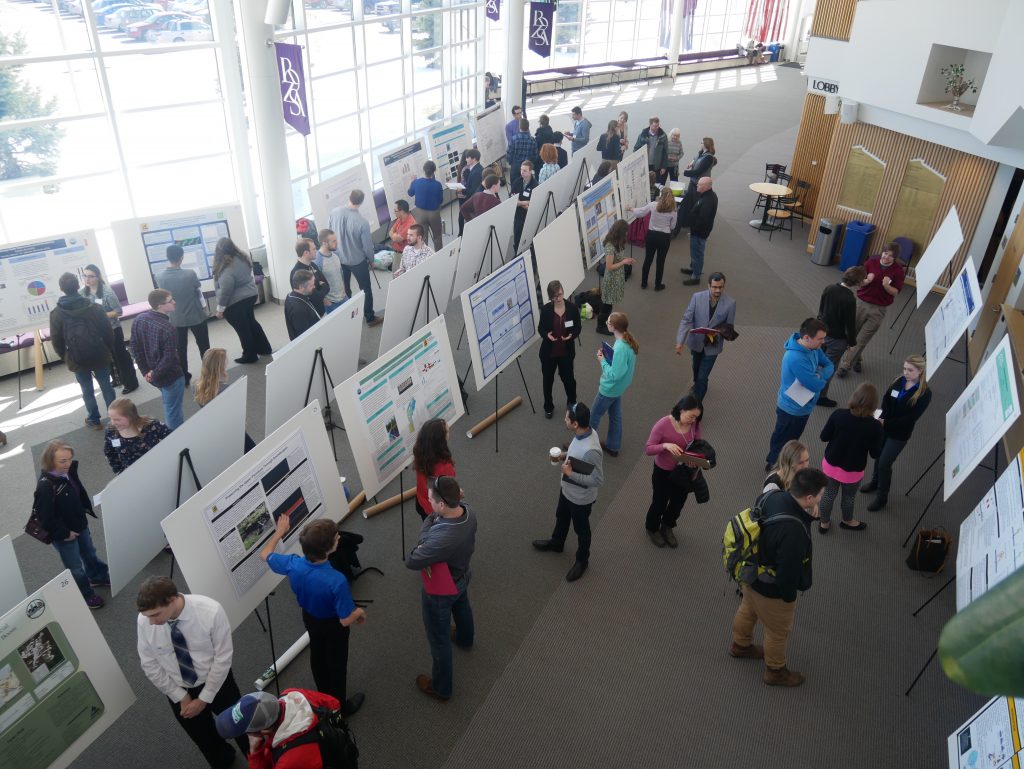
The Pavlis Honors College would also like to recognize other Honors student nominees: Clara Peterson, nominated for the Exceptional Enthusiasm as a Student Leader Award and Peter Beach and Rachel Chard, both nominated for Outstanding Future Alumni. A list of all other 2018 Student Leadership Award winners can be found here.
By Amy Karagiannakis
Six undergraduate student teams from Michigan Technological University traveled to Central Michigan University (CMU) to compete in the eighth annual New Venture Competition held Friday, April 13. The event was co-sponsored by Michigan Tech’s Innovation Center for Entrepreneurship (ICE). Student teams from Michigan Tech and CMU presented business plans and pitches to panels of experienced entrepreneurs. Four of Michigan Tech’s six competing teams took home cash and in-kind awards.
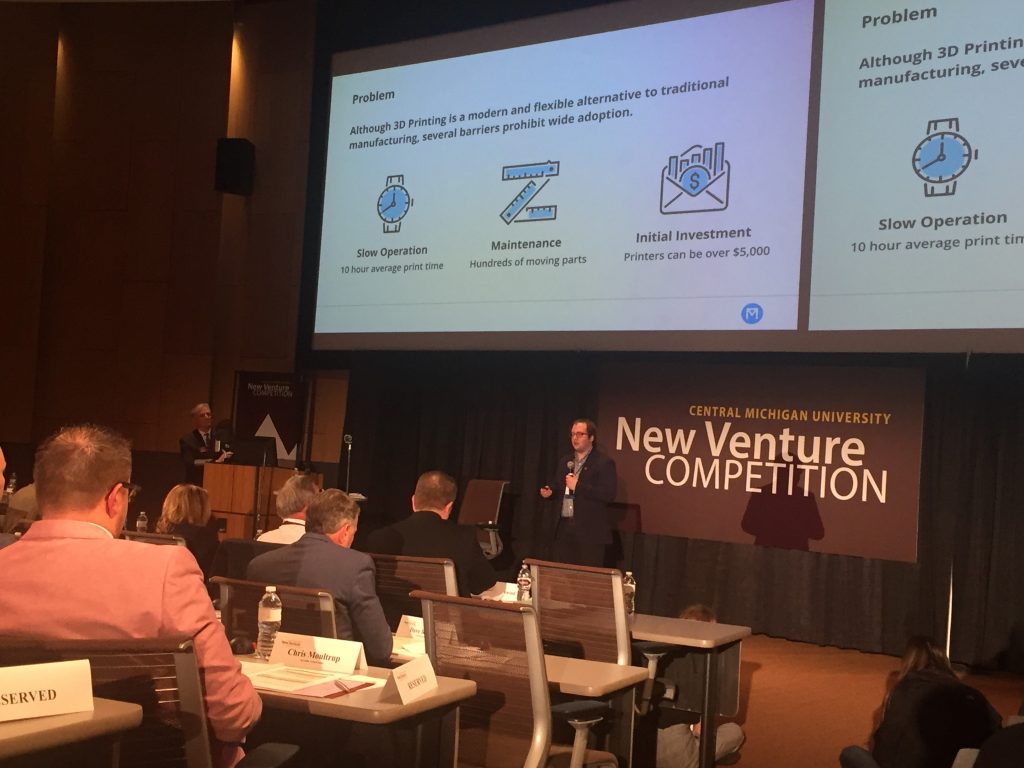
Team Makerhub led by Cedric Kennedy (business administration and management ’16) and Adam Weber (computer network and system administration) won the Korson Family Highest Growth Potential award and $10,000. Makerhub crowdsources 3-D printers in order to fulfill the need for 3-D printed parts. When asked what’s next for Makerhub, Weber shared, “Right now, Makerhub is being tested in a private beta with a large handful of users. The prize money will be used to accelerate the development process and release it to the general public very soon.”
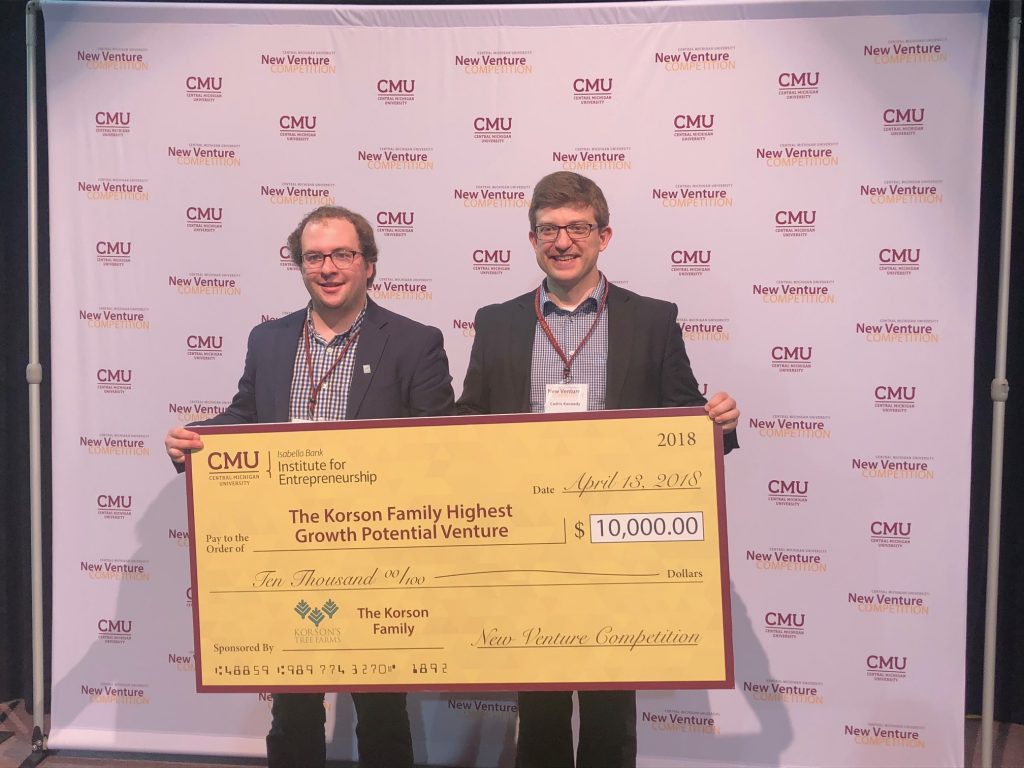
Team Fitstop took first place in the pitch competition and was awarded $1,000. Fitstop founders, Gabe Giddings (computer science) and Jacob Carley (electrical engineering), participated in Michigan Tech’s I-Corps Site Program in January. Directed by Mary Raber, assistant dean of Pavlis Honors College, I-Corps is a team-based program structure that was developed through a partnership between the National Science Foundation (NSF) and Silicon Valley entrepreneurs. The workshop provides an introduction to the Lean Start-up business development methodology, which focuses on getting out of the lab and using the tools of customer discovery and the business model canvas to evaluate the commercial potential of innovative technologies. Jim Baker, executive director of innovation and industry engagement at Michigan Tech served as mentor for Fitstop’s participation in the competition. “Gabe and Jake have worked hard on engagement with customers, including gym owners and travelers seeking a better workout experience on the road. Understanding the needs of both customer segments has been very helpful in presenting a compelling value proposition that translates into a very effective pitch, as shown by this award,” noted Baker.
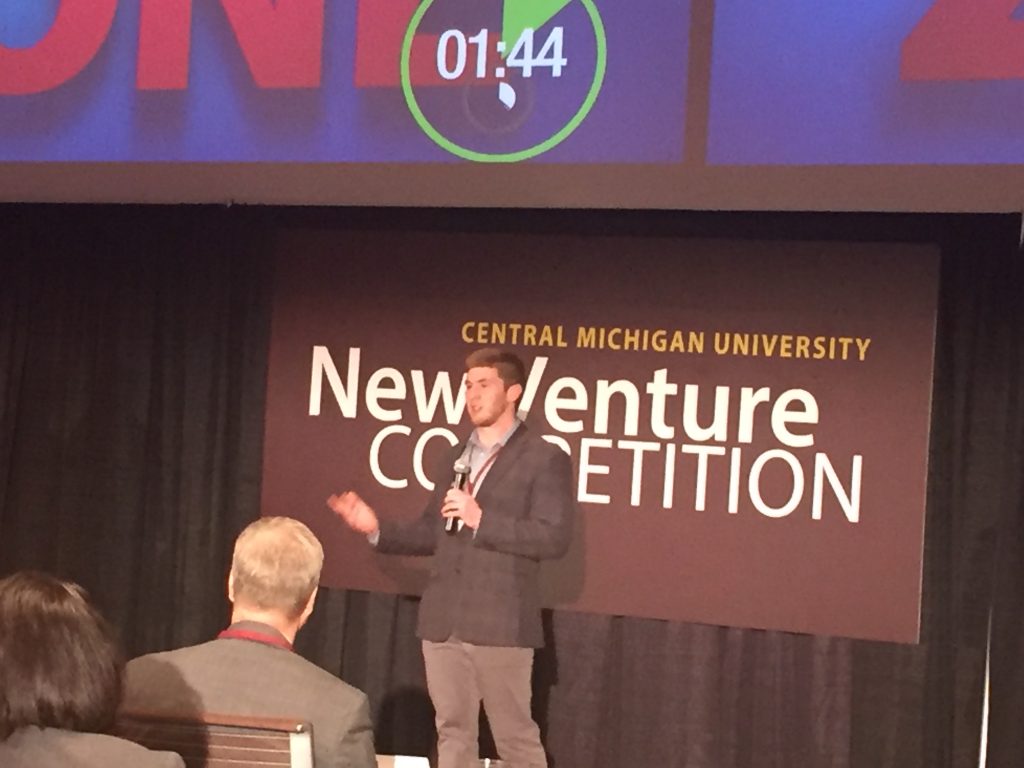
The core themes of CMU’s New Venture Competition are the hands-on approach to proving that a product works and providing a business model that demonstrates an understanding of concepts that attract investors and customers. Pavlis Honors College student Kyle Ludwig won the $250 Audience Choice Award in the pitch component of the competition for his startup Looma. In addition, Looma was also awarded $1,500 in legal assistance from Foster Swift. Ludwig also participated in Michigan Tech’s I-Corps Site Workshop and found it to be very helpful in developing Looma’s business plan. “The I-Corp Site Program at Michigan Tech helped me realize the direction for my business by introducing me to processes which inspire product development around the customer,” shared Ludwig.
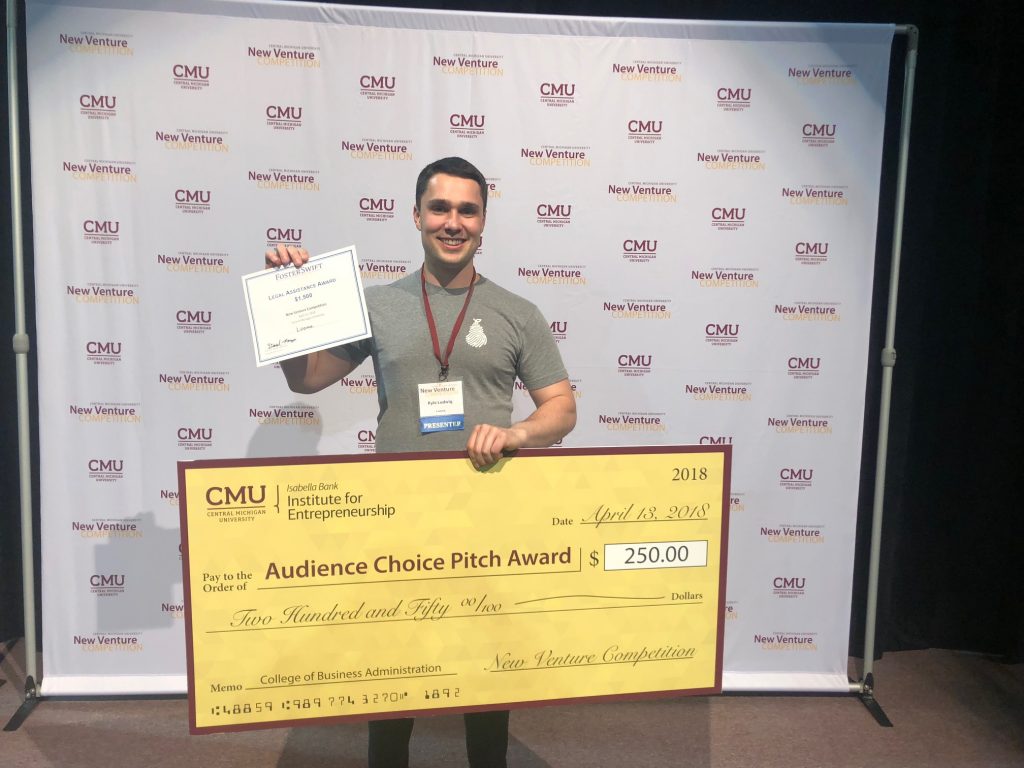
Michigan Tech’s Hinge was awarded second runner up in the pitch component of the competition and $250. Isaiah Pfund (mechanical engineering), Jack Horrigan (electrical engineering), and Tanner Sheahan (chemical engineering), of Hinge, participated in the Michigan Tech Consumer Products Challenge last January and are working on a self-sanitizing toilet as well as other consumer and industrial product ideas. Horrigan and Pfund were also winners of best elevator pitch at the Bob Mark competition last fall.
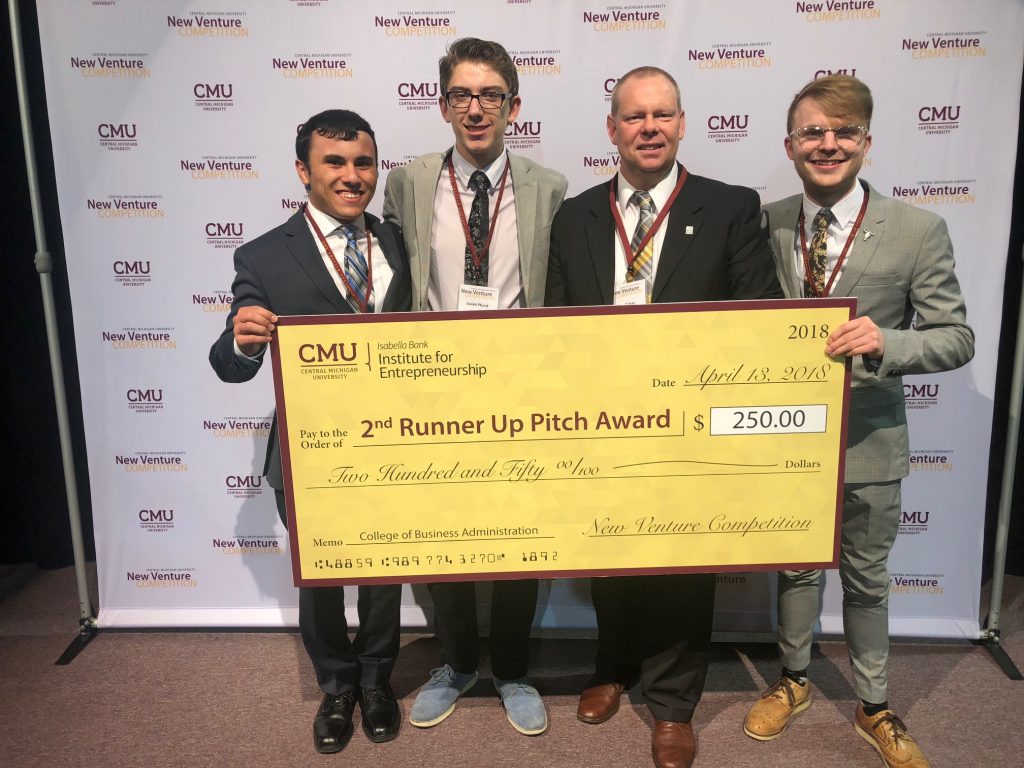
This is the eighth year of the New Venture competition and the seventh year of Michigan Tech’s partnership with CMU. Last year, Michigan Tech students Nick Dubiel and Morgan Crocker won Best Overall Venture, which came with $30,000 and a year of mentoring support from Blue Water Angels in Midland for their product The Metaloid.
Michigan Tech’s Innovation Center for Entrepreneurship (ICE) within the Pavlis Honors College continues to be an excellent resource for students looking to start their own business or bring new ideas and concepts to the next stage of development. The mission of the center is to harness the potential of the Michigan Tech campus community to innovate, develop, and implement ideas and inventions by building and maintaining a strong and integrated ecosystem with a cohesive set of entrepreneurial and innovation resources to enable success. Students interested in innovating, developing, and implementing their ideas and inventions are encouraged to visit the Pavlis Honors College (M&M 722) to learn more about ICE and the resources available to them. A schedule of upcoming student innovator and entrepreneur competitions, in order of registration deadlines, can be found on our website.
Earlier this week, I spent a day with Michigan Tech students in Silicon Valley and had the opportunity to visit with a number of Michigan Tech alums. Among the Tech alums were Stuart Pann, class of ’81, Alex Johnson, class of 92′ and Tony Altobelli. They welcomed us to their companies (HP, Facebook, and Google!), gave us tours and shared their stories. As they presented their ideas to us, I recorded the advice that they gave. Here it is:
- It’s not about your major – it’s about what you want to DO
- A Michigan Tech background gives you great quantitative skills to build on (these were all engineers), but you need more
- Follow your passion – know your strengths and what you love to do
- Put in the work – effort and perseverance matter – but also know when to ask for help
- Your first job matters, it sets up how you will view the world
- Money isn’t everything, just something – make sure the value system of the company works for you (this might mean taking your lowest offer)
- The hallmark of a good interview is preparation – you need to convey curiosity, your ability to work in teams and a sense of humility – tell why you want to join THIS company – do your homework – share your projects AND passions – tell your story
- Map your path to success, but adapt as opportunities come up and changes happen
- Enjoy the ups and downs – nothing in life is perfect – don’t give up on your dreams
Within these valuable tidbits, I could feel the alignment with Pavlis. Here, we build on the skills in your major and challenge you to find your own pathway to success – to figure out who you are and what you want to DO. We demand effort and offer resources. We encourage you to explore your values and purpose and use these to identify the right opportunities for you. We value curiosity, communication and ask you to balance confidence with humility. We push you to develop professional flexibility, to act in the face of uncertainty. We help you compose and then tell your story. It’s hard work, but in the end, we believe that this development of character is exactly what it takes to propel you to your goals and ultimately YOUR success.
I think what stood out most to me was that every one of these alums loves what they do. They all talked about how much they love coming to work every day – even on challenging days. Imagine how that feels and how following their advice might get you there!
By Amy Karagiannakis
Michigan Tech has been awarded the VentureWell Faculty Grant in the amount of $22,800 for the proposal “Building a Curriculum that Fosters an Innovation & Entrepreneurial (I&E) Mindset for our First-year Students.” The Innovation Center for Entrepreneurship teamed up with Engineering Fundamentals and the School of Business and Economics (SBE) to develop a first-year curriculum that infuses design thinking methodology into Tech’s first-year engineering and business courses.
All engineering students at Tech are required to complete ENG1102, Engineering Modeling and Design in their first year and SBE offers BUS1100, Introduction to Business to their first-year students. Last Fall semester, working off a previously awarded grant, PIs Mary Raber, Mary Fraley, Brett Hamlin, and Amber Kemppainen piloted incorporating the design-thinking process into two sections of ENG1102. Concurrently, the team also worked with Jon Leinonen to incorporate a similar set of design-thinking modules in three sections of BUS1100. Students in these courses were ultimately required to form teams and develop innovative solutions for a self-identified problem. Prior to being given a designated challenge however, students were introduced to design thinking methodology through a series of interactive workshops and activities. With the knowledge and concepts they learned, they could apply the phases of empathy, define, ideation, prototype, and test to developing solutions to their prescribed team challenges.
Mary Fraley, Lecturer for Engineering Fundamentals reflected, “We learned in the pilot that including design thinking in a first-year engineering course was an effective way to introduce students to an entrepreneurial mindset. Through the development of an innovative product, students not only improved their critical thinking skills, but also developed an understanding of incorporating customer needs into their design. We look forward to refining this approach in the future.”
The new grant will allow Tech’s PIs to expand upon the Fall pilot, affording business and engineering students the opportunity to work together on innovative solutions to problems they identify. The goal is to refine the curriculum based on lessons learned from last Fall hoping to eventually introduce a permanent curricular offering. The new grant money will also enable Tech to train additional faculty in the design thinking and lean startup methodology through workshops facilitated by those who have completed Stanford’s Teaching and Learning Studio training, as well as Steve Blank’s Lean Launchpad training. The team also plans to incorporate Tech’s new makerspace, the Alley, for prototyping and testing student design projects.
Jon Leinonen, lecturer in the School of Business and Economics highlights the interdisciplinary teamwork that the VentureWell project provides as a point of distinction for Michigan Tech’s students, saying, “In this setting, students learn to apply business principles in a technical environment. This provides a foundation for more creative, feasible and rewarding outcomes when graduates step into industry.”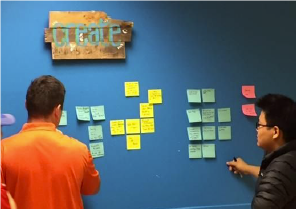
This collaborative project is lead by a team of faculty from the Innovative Center for Entrepreneurship, the Engineering Fundamentals Department and the School of Business. Mary Raber has experience with developing educational programming around Design Thinking, Lean Start-up and makerspaces. Mary Fraley, Brett Hamlin and Amber Kemppainen are instructors in the first-year engineering program and Jon Leinonen is a business instructor and I&E mentor. Together, this team will lead the efforts to continue to integrate design thinking and lean startup concepts into the core engineering fundamentals and business courses.
Mary Raber, co-director of the Innovation Center for Entrepreneurship and Assistant Dean of the Pavlis Honors College stated, “This grant from VentureWell will allow us to build upon the pilot conducted in Fall 2017 that introduced design thinking into first-year engineering and business courses. Our goal is to give these students an opportunity to begin developing an innovation and entrepreneurial mindset while working together to create innovative solutions to problems of interest.”
![]() The Anthill, a podcast of news outlet The Conversation (UK), ran an interview with Laura Kasson Fiss (Pavlis Honors College) and Andrew Fiss (HU), as well as recordings of songs they performed as part of their presentation at the British Science Festival. Their research considers songs as science communication, in this case nineteenth-century women using parody to defend their right to study traditionally male subjects such as mathematics. Check out this link to hear more about their presentation and the British Science Festival.
The Anthill, a podcast of news outlet The Conversation (UK), ran an interview with Laura Kasson Fiss (Pavlis Honors College) and Andrew Fiss (HU), as well as recordings of songs they performed as part of their presentation at the British Science Festival. Their research considers songs as science communication, in this case nineteenth-century women using parody to defend their right to study traditionally male subjects such as mathematics. Check out this link to hear more about their presentation and the British Science Festival.
By Amy Karagiannakis
The 33rd annual Shell Eco-marathon Americas competition took place over the weekend, April 27-30 in Detroit, MI. This year’s event was the second season that Michigan Tech’s Supermileage Systems Enterprise team competed. Shell Eco-marathon challenges student teams from around the world to design, build, test and drive ultra-energy-efficient vehicles. More than 100 teams from universities and high schools across the country and abroad came to the heart of the Motor City to compete on the track located on the city streets surrounding the Cobo Convention Center.
In order to participate, teams must successfully complete a 4-phase registration process, including submission of technical information about their vehicle and design. There are two vehicle categories: urban concept and prototype. Within these categories there are three energy types: internal combustion (multiple fuel types), battery, and hydrogen. In order to compete, teams must pass a rigorous technical inspection and complete 10 consecutive laps around a 0.6 mile closed course in downtown Detroit, maintaining a minimum average speed of 15 mph. Awards are given for teams achieving the highest efficiency (either mpg or m/kWh). Off-track awards are also given for Innovation, Communication, Safety, Design, and Perseverance & Team Spirit. This year, 119 teams from 8 different countries were approved to compete.
The Supermileage Enterprise competed in the Prototype/Battery Electric class. Of the 27 teams that participated, 22 made it through technical inspection and 17 completed at least one performance run. Tech’s Supermileage Systems Enterprise was one of those 17 teams. The team’s design included a 500W brushed DC motor and controller using a 48V/20Ah lithium ion battery back and battery management system. The motor controller must be purpose-built and designed by the team (i.e. no off the shelf controllers allowed). The Supermileage Enterprise improved their controller design from last year and upgraded the battery for improved vehicle acceleration. They completed one run with 104 m/kWh…about 3,500 MPGe. The team took 10th place in the BEV prototype category.
Michigan Tech’s Supermileage Systems Enterprise team also competed for the Communications, Safety, and Technical Innovation Awards at the Shell Eco-marathon. They won the Technical Innovation Award for their flexible motor controller design. The judges reviewed the application and interviewed the team. They noted the team’s well-defined engineering requirements as one of the key strengths over other applications.
Rick Berkey, Supermileage Systems Enteprise advisor and Director of Michigan Tech’s Enterprise Program, commented, “It goes without saying that I am so proud of our team’s accomplishments, throughout the year and especially at the event. Competing in the electric vehicle category is particularly challenging given that teams must build their own motor controller. This is not a trivial task! Receiving the Technical Innovation Award was a real testament to the team’s motor controller design AND their ability to articulate what makes it innovative and unique. To see us place 10th in only our second year of SEM competition shows the talent and drive of the Supermileage Systems Enterprise. It’s rewarding and humbling to work with such a great group of students and to see them get recognition on a national stage among peers from schools around the globe – that was the highlight for me.”
The $3,000 monetary award will be put to good use, and the Supermileage Systems Enterprise now has an impressive trophy to display on campus.
The Supermileage Systems Enterprise team will now begin converting their vehicle over to the internal combustion engine for the upcoming SAE Supermileage competition on June 8-9 at the Eaton Proving Grounds in Marshall, MI. Good luck and congratulations!

